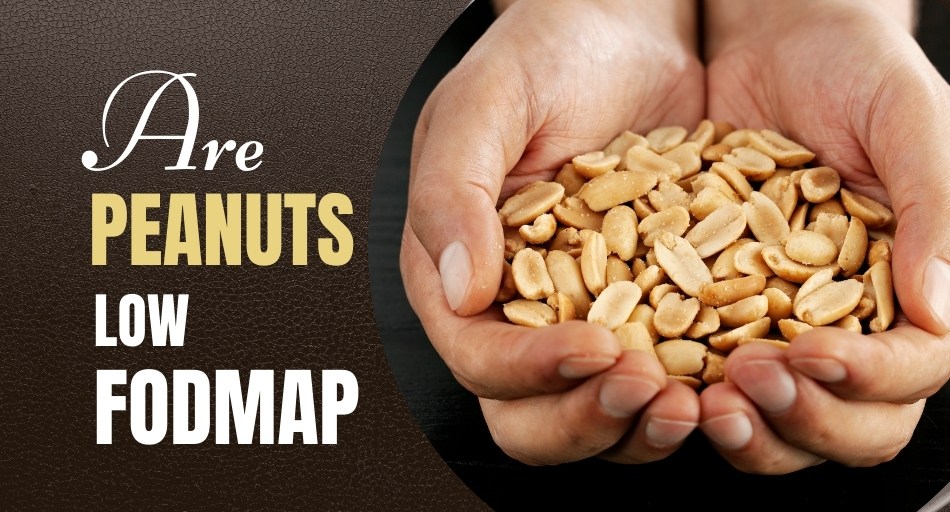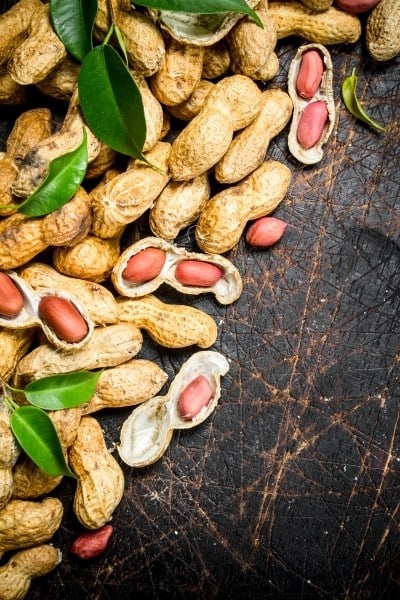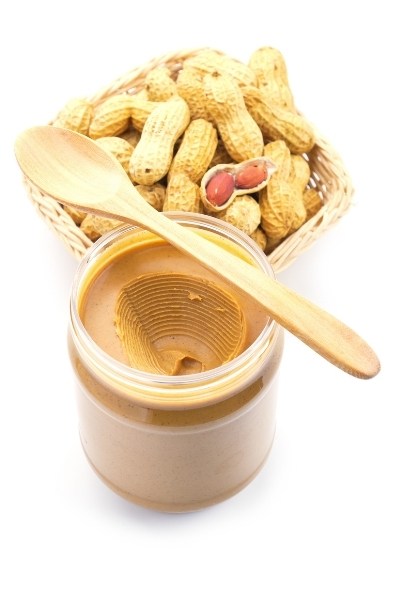Consuming a diet low in FODMAPs has been shown to improve the symptoms of irritable bowel syndrome (IBS).

This is because FODMAPs are indigestible carbs that are tough for your digestive system to handle.
Unfortunately, many foods contain FODMAPs. But some foods aren’t too high and thus allowed on a low FODMAP diet.
For example, a wide variety of nuts can be consumed on a diet low in FODMAPs. But how about peanuts? Are they low or high in FODMAPs?
Table of Contents
Are Peanuts Low FODMAP?
Peanuts are considered a low FODMAP food, which means you can safely consume them on a low FODMAP diet. But still, make sure to stick to a certain serving size and consume them in moderation.
Peanuts are also rich in various nutrients, including healthy fats, protein, niacin, folate, phosphorus, and manganese, among others. So, eating them can help you stay healthy by loading up on these nutrients.
How low in FODMAPs are peanuts?

Peanuts don’t contain too many carbs, so they can be consumed on a low FODMAP diet as long as it’s in moderation.
A serving of around 30 peanuts (28 g) is considered low in FODMAPs and should be tolerated by most people with IBS.
But remember that peanuts are high in calories and fat, which can be hard for your digestive system, especially if you already suffer from IBS.
So, keep the serving sizes small and don’t consume peanuts too frequently.
Can you eat peanuts on a low FODMAP diet?
Peanuts are the type of nuts that are allowed on a low FODMAP diet. But it’s still important to consume them in small quantities, as the indigestible carbs add up if you consume too many in one sitting.

A safe serving is around 30 peanuts (28 g). Some people might be able to consume more, but it’s best to start off slowly and check if your digestive system tolerates peanuts and that they don’t worsen your symptoms.
Are oil-roasted peanuts low in FODMAPs?
Both oil- and dry-roasted peanuts are allowed in the same servings on a low FODMAP diet.
This is because their carb content doesn’t differ much, so they’re both low in FODMAPs in small servings.
On the other hand, oil-roasted peanuts are higher in fats. So, they might be harder for your body to digest.
Because of that, you might be better off choosing dry-roasted peanuts instead, especially if you’re digestive system is very sensitive.
Is peanut butter low in FODMAPs?
Whether peanut butter is low in FODMAPs depends on the brand and other additives that it contains.
Most brands of peanut butter are considered low in FODMAPs in servings of around two tablespoons or 32 grams.
When eating peanut butter on a low FODMAP diet, remember to check the ingredients list. This is important as some contain other high-FODMAP ingredients like molasses or fructose syrup.
These are high in FODMAPs, so they should be avoided. Instead, choose plain peanut butter.

Plain peanut butter is still delicious and rich in various nutrients. For example, it contains a lot of vitamin E, niacin, magnesium, and phosphorus. Some varieties may also have other vitamins added as well as a higher content of omega-3 fatty acids.
Are peanuts good for you?
Peanuts are a very nutrient-dense food, providing you with calories from all three macronutrients: fats, carbs, and proteins.
Most of the calories in peanuts come from fats. While this might worry some people, peanuts are actually a source of healthy fats.
These fats have been linked with a lower risk of heart disease and other cardiovascular issues.
Peanuts also contain quite a great dose of protein, around 6.6 grams (13% of your daily need) in a one-ounce (30 peanuts) serving.
Protein is an important nutrient for preserving your muscles and preventing overeating.
Because of that, peanuts can make for a great snack choice for people trying to lose weight.

When it comes to nutrients, peanuts provide you with a great dose of niacin, about 19% of your daily need in just 30 peanuts.
Niacin, also called vitamin B3, has a lot of health benefits, including lowering cholesterol, easing arthritis, and boosting brain function.
It’s also responsible for improving blood fat levels and reducing blood pressure.
Folate is yet another vitamin found in peanuts in great amounts. This micronutrient is especially important for pregnant women as it reduces the risk of birth defects of the spine and brain.
In addition, folate is crucial for the formation of red blood cells, so make sure to get enough of it each day.
What’s more, peanuts make for one of the best dietary sources of biotin. Also called vitamin B7, this micronutrient is especially important for the health of your skin, hair, and nails.
Biotin also promotes brain function, regulates metabolism, and suppresses inflammation. So, loading up on biotin-rich foods like peanuts is a great idea.
Peanuts also contain several minerals, including magnesium, phosphorus, copper, and manganese.
All of these minerals help keep your bones healthy, boost your immune system, and contribute to disease prevention.
Since mineral deficiencies are common these days, eating peanuts can help prevent them, especially if you include them in larger meals to ensure mineral absorption.

Peanuts are also loaded with powerful antioxidants. These plant compounds help flush out free radicals from your body, preventing oxidative stress and damage to your cells.
Thanks to that, you’re at a lower risk of chronic conditions like diabetes, heart disease, and even cancer.
The same antioxidants also reduce inflammation in your body, which further improves your health.
So, there are many reasons to include some peanuts in your diet.
Conclusion
In moderation, peanuts can be consumed on a low FODMAP diet without triggering any IBS-related symptoms.
But make sure to consume a small portion and eat them as part of a healthy, balanced diet.
If you do that, you can get a lot of wonderful health benefits, as peanuts are very nutritious and rich in healthy fats and antioxidants.
So, they make for a great addition to any diet.
Sources: Nutrition Data, Science Direct, and National Library of Medicine
